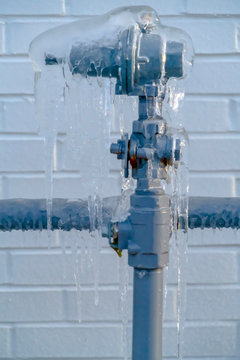Guidance for Avoiding Frozen Plumbing in Cold Weather: Expert Tips
Guidance for Avoiding Frozen Plumbing in Cold Weather: Expert Tips
Blog Article
Everyone may have their own individual idea in relation to Helpful Tips to Prevent Frozen Pipes this Winter.

Cold weather can wreak havoc on your plumbing, specifically by freezing pipelines. Right here's how to stop it from happening and what to do if it does.
Intro
As temperatures decrease, the risk of icy pipelines rises, potentially causing pricey fixings and water damages. Understanding how to stop frozen pipelines is critical for homeowners in cold environments.
Prevention Tips
Insulating susceptible pipes
Wrap pipes in insulation sleeves or use heat tape to shield them from freezing temperature levels. Concentrate on pipelines in unheated or external locations of the home.
Home heating methods
Keep indoor spaces appropriately heated up, especially areas with pipes. Open cupboard doors to allow cozy air to distribute around pipes under sinks.
How to identify frozen pipelines
Search for lowered water flow from faucets, uncommon smells or sounds from pipelines, and noticeable frost on revealed pipes.
Long-Term Solutions
Structural adjustments
Think about rerouting pipes away from outside wall surfaces or unheated locations. Add additional insulation to attics, cellars, and crawl spaces.
Updating insulation
Purchase high-grade insulation for pipelines, attics, and wall surfaces. Appropriate insulation helps keep consistent temperature levels and reduces the danger of frozen pipes.
Safeguarding Outdoor Pipes
Garden hose pipes and exterior faucets
Separate and drain yard hose pipes prior to winter season. Install frost-proof spigots or cover exterior taps with shielded caps.
Understanding Icy Pipes
What creates pipes to ice up?
Pipelines freeze when exposed to temperature levels below 32 ° F (0 ° C) for prolonged periods. As water inside the pipelines freezes, it increases, putting pressure on the pipeline walls and potentially creating them to break.
Threats and damages
Icy pipes can cause water disturbances, residential or commercial property damage, and pricey repair services. Burst pipelines can flood homes and create substantial architectural damage.
Indicators of Frozen Water Lines
Identifying frozen pipelines early can prevent them from rupturing.
What to Do If Your Pipelines Freeze
Immediate actions to take
If you think icy pipes, keep taps open up to soothe stress as the ice melts. Use a hairdryer or towels taken in warm water to thaw pipes gradually.
Final thought
Avoiding frozen pipelines requires aggressive steps and fast actions. By understanding the reasons, signs, and safety nets, homeowners can shield their pipes during winter.
Helpful Tips to Prevent Frozen Pipes this Winter
UNDERSTANDING THE BASICS: WHY PIPES FREEZE AND WHY IT’S A PROBLEM
Water freezing inside pipes is common during the winter months, but understanding why pipes freeze, and the potential problems it can cause is crucial in preventing such incidents. This section will delve into the basics of why pipes freeze and the associated problems that may arise.
THE SCIENCE BEHIND FROZEN PIPES
When water reaches freezing temperatures, it undergoes a physical transformation and solidifies into ice. This expansion of water as it freezes is the primary reason pipes can burst. As the water inside the pipe freezes, it expands, creating immense pressure on the walls. If the pressure becomes too great, the pipe can crack or rupture, leading to leaks and water damage.
FACTORS THAT CONTRIBUTE TO PIPE FREEZING
Low Temperatures: Extremely cold weather, especially below freezing, increases the risk of pipes freezing. Uninsulated or Poorly Insulated Pipes: Pipes located in unheated areas, such as basements, crawl spaces, or attics, are more prone to freezing. Insufficient insulation or lack of insulation altogether exacerbates the problem. Exterior Wall Exposure: Pipes running along exterior walls are susceptible to freezing as they encounter colder temperatures outside. Lack of Heating or Temperature Regulation: Inadequate heating or inconsistent temperature control in your home can contribute to frozen pipes. PROBLEMS CAUSED BY FROZEN PIPES
- Pipe Bursting: As mentioned earlier, the expansion of water as it freezes can cause pipes to burst, resulting in significant water damage.
- Water Damage: When pipes burst, it can lead to flooding and water damage to your property, including walls, ceilings, flooring, and personal belongings.
- Structural Damage: Prolonged exposure to water from burst pipes can compromise the structural integrity of your home, leading to costly repairs.
- Mold and Mildew Growth: Excess moisture from water damage can create a favorable environment for mold and mildew growth, posing health risks to occupants.
- Disrupted Water Supply: Frozen pipes can also result in a complete or partial loss of water supply until the issue is resolved.
WHY CERTAIN PIPES ARE MORE PRONE TO FREEZING
- Location: Pipes located in unheated or poorly insulated areas, such as basements, crawl spaces, attics, or exterior walls, are at higher risk of freezing.
- Exterior Pipes: Outdoor pipes, such as those used for irrigation or exposed plumbing, are particularly vulnerable to freezing as they are directly exposed to the elements.
- Supply Lines: Pipes that carry water from the main water supply into your home, including the main water line, are critical to protect as freezing in these lines can affect your entire plumbing system.
- Underground Pipes: Pipes buried underground, such as those connected to sprinkler systems or outdoor faucets, can be susceptible to freezing if not properly insulated.
https://busybusy.com/blog/helpful-tips-to-prevent-frozen-pipes-this-winter/

We are very excited about Preventing and dealing with frozen pipes and I'm hoping you liked the entire piece. If you enjoyed reading our page kindly do not forget to share it. I am grateful for being here. Revisit us soon.
Call Today Report this page